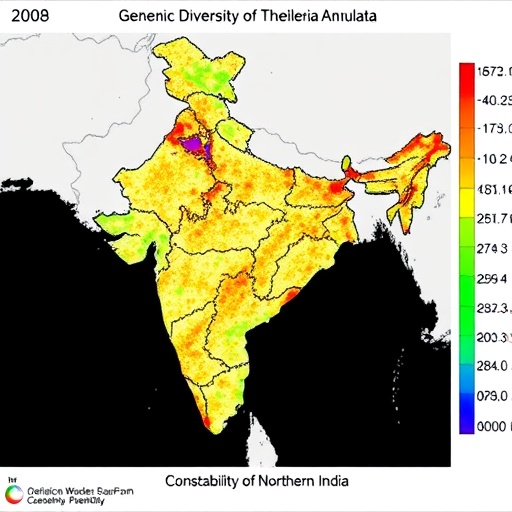
In an exciting development in the field of plant genetics, researchers have conducted a comprehensive analysis of the sucrose nonfermenting 1-related protein kinase 2 (SnRK2) gene family in broomcorn millet, a resilient crop scientifically known as Panicum miliaceum L. This study, detailed in a forthcoming article in BMC Genomics, focuses on the role of this gene family in plant responses to abiotic stress conditions, which comprise environmental factors such as drought, salinity, and extreme temperatures.
Broomcorn millet, a staple food in many arid and semi-arid regions of the world, has garnered significant attention due to its hardiness and adaptability to challenging growing conditions. The SnRK2 gene family plays a vital role in regulating various physiological processes in plants. This includes responses to abiotic stresses, signaling pathways, and developmental processes, making them critical targets for enhancing crop resilience against climate variability.
The researchers undertook a detailed genomic analysis to identify and characterize the members of the SnRK2 gene family in broomcorn millet. Utilizing state-of-the-art bioinformatics tools, they were able to pinpoint specific genes within the SnRK2 family and investigate their evolutionary history and functional diversity. This foundational work lays the groundwork for further functional studies, potentially leading to breakthroughs in crop improvement strategies aimed at strengthening food security.
In their study, the researchers first performed a thorough gene identification process, leveraging genomic data to sift through sequences and uncover the SnRK2 gene family members. They used comparative genomics as a means to discern these genes’ evolutionary relationships across different species, providing insights into how these genes have adapted to diverse environmental stresses over time. Such analyses help in understanding the functional roles these genes play in plant survival.
The next phase of the research involved cloning and characterizing the identified SnRK2 genes. This process not only ascertained the presence and functionality of these genes but also allowed researchers to understand their expression profiles under various stress conditions. This aspect of the research is particularly significant, as it suggests how certain genes become activated or suppressed in response to stress, yielding valuable insights for genetic engineering applications.
One of the most intriguing aspects of the study was its exploration of the regulatory mechanisms governing SnRK2 gene expression. The researchers identified key elements within gene promoters that respond to abiotic stresses, contributing to a better understanding of how plants perceive and react to environmental challenges. By dissecting these mechanisms, scientists may be able to engineer plants with enhanced stress tolerance, potentially transforming how crops are cultivated in increasingly erratic climatic conditions.
Furthermore, the findings from this study underscore the potential of broomcorn millet as a model organism for research into abiotic stress responses. Given its robust performance under stress, the crop serves as an excellent proxy for investigating the genetic and molecular underpinnings of stress tolerance. This research might inspire further studies on other resilient crops, potentially broadening the scope of applications for the knowledge gained from broomcorn millet.
As climate change continues to impact agricultural productivity globally, the significance of this research cannot be overstated. Broomcorn millet’s ability to withstand drought and salinity makes it particularly valuable in regions where water scarcity poses a significant threat to food security. The insights gained through this study could pave the way for developing new varieties of broomcorn millet that are not only high-yielding but also remarkably resilient to climate-induced stressors.
The researchers also highlighted the importance of integrating genetic findings with traditional breeding methods, which can accelerate the pace of developing stress-resistant crops. They suggested that combining modern genomic tools with conventional breeding strategies may significantly enhance the ability to produce crops that can thrive in a rapidly changing environment.
In addition to its academic significance, the study’s results have practical implications for farmers in regions that grapple with abiotic stresses. Armed with the knowledge of the SnRK2 gene family and its influence on stress response, farmers may find new strategies to cultivate broomcorn millet more effectively, ensuring a steady food supply even in adverse conditions. As such, this research not only contributes to scientific understanding but also has the potential to make a tangible impact on agricultural practices.
The innovative angle of this study lies in its comprehensive approach, analyzing not just the genetic components but also the environmental interactions that influence plant responses. By viewing stress resilience through a multifaceted lens, the researchers have provided a holistic perspective on how crops can be engineered and bred for greater viability in challenging climates.
In summary, the comprehensive analysis of the SnRK2 gene family in broomcorn millet presents a significant leap forward in our understanding of plant adaptation to abiotic stress. As studies like this one continue to unfold, they hold the promise of revolutionizing agricultural practices, enhancing food security, and ensuring that crops can thrive even as global climates become increasingly unpredictable.
Researchers involved in the study have set a high benchmark for future investigations in plant genomics, making it clear that understanding and manipulating gene families such as SnRK2 will be key to unlocking the potential of resilient crops in an era of climate uncertainty.
With further exploration and validation of these findings, it is hoped that we will soon see the fruits of this research translate into real-world applications, leading to more sustainable agricultural systems capable of weathering the storm of climate change. As the world looks for solutions to pressing food security challenges, the study of broomcorn millet provides a hopeful sign that science can and will lead to innovative agricultural strategies.
Subject of Research: Analysis of the sucrose nonfermenting 1-related protein kinase 2 gene family in broomcorn millet under abiotic stress conditions.
Article Title: Comprehensive analysis of the sucrose nonfermenting 1-related protein kinase 2 gene family in broomcorn millet (Panicum miliaceum L.) under abiotic stress conditions.
Article References:
Zhou, W., Qiao, Y., Li, R. et al. Comprehensive analysis of the sucrose nonfermenting 1-related protein kinase 2 gene family in broomcorn millet (Panicum miliaceum L.) under abiotic stress conditions.
BMC Genomics 26, 797 (2025). https://doi.org/10.1186/s12864-025-11992-1
Image Credits: AI Generated
DOI:
Keywords: SnRK2 gene family, broomcorn millet, abiotic stress, plant resilience, climate change, genetic engineering, food security, agricultural practices, genomic analysis.
Tags: abiotic stress responses in plantsbioinformatics in plant geneticsbroomcorn millet genetic analysiscrop improvement strategiescrop resilience against climate changedrought and salinity tolerance in milletevolutionary history of SnRK2 genesgenomic analysis of millet cropsPanicum miliaceum L. researchphysiological processes in plant developmentSnRK2 gene family characterizationsucrose nonfermenting kinase genes




